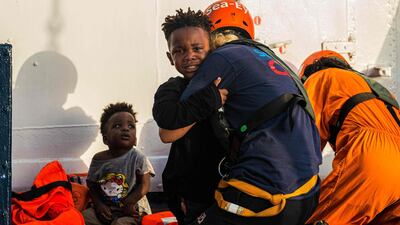Less than 24 hours after allowing 135 migrants to leave a rescue ship, the Italian government has blocked a German-flagged vessel from entering Italian waters with migrants plucked from the sea off Libya.
Italy's Interior Minister Matteo Salvini on Wednesday struck a deal to resolve the days-long crisis involving the first rescue vessel, the Gregoretti, with France, Germany, Ireland, Luxembourg and Portugal agreeing to take some of the migrants.
Then Mr Salvini, also the Deputy Prime Minister, indicated he was ready to begin another standoff with another migrant rescue ship, the Alan Kurdi.
"Here we go again, the German NGO doesn't care about international authority," he tweeted late on Wednesday, referring to the rescue operations group Sea-Eye. "I won't give up."
Mr Salvini, the far-right leader who may be the next prime minister, has ridden a wave of populism fuelled in part by discontent over the arrival of refugees from North Africa.
In June, Italian authorities arrested Carola Rackete, a German rescue ship captain, for docking at the island of Lampedusa.
Sea-Eye spokeswoman Carlotta Weibl told The National that the Alan Kurdi – named for the Kurdish boy, 3, whose body washed up in Bodrum, Turkey, in 2015 – had arrived in international waters off Lampedusa early on Thursday afternoon.
“We went to Lampedusa anyway because it is the closest safe port,” Ms Weibl said. “We will not enter without permission.”
She said Mr Salvini had asserted that he would block the rescue ship even before it set its course for the Italian island off the coast southern coast of Italy, between Tunisia and Malta.
Ms Weibl said negotiations between German diplomats and the relevant authorities in Italy were continuing.
“People have a right to be brought to safety so every hour we have to wait is already too much,” she said.
“We have totally exhausted people, mentally and physically."
There is an indication that Germany may use the deal with Italy over the Gregoretti to provide safe passage for the Alan Kurdi.
Ms Weibl said she had been told Berlin might refuse to accept its portion of the refugees from the the Gregoretti if the Alan Kurdi is not allowed to dock.
The crew has enough food to sustain those it has rescued for days but not longer, she said.
The migrants were rescued by the Alan Kurdi after setting off from Libya from Tajoura, an eastern suburb of the Libyan capital Tripoli.
The area, a centre for Libya’s people trafficking black market, has also been the site of fierce clashes in recent months between opposing forces in the country’s bloody civil war.
Some of the refugees, all of whom had arrived in Libya from sub-Saharan Africa, had been caught-up in the fighting, Ms Weibl said.
One man had a fresh gunshot wound to his arm and a boy was suffering from an older one.
Two others sustained injuries in a June air strike on a migrant detention centre in Tajoura that killed 44 and wounded 130.
The UN’s migration agency said the arrival of migrants and refugees to Europe over the Mediterranean fell dramatically over the past year.
On July 26 the agency reported that 36,670 migrants and refugees had entered Europe in 2019, a 35 per cent decrease from the 54,978 that arrived during the same period last year.
But the journey is still deadly, with 686 killed in the Mediterranean trying to reach Europe since the start of the year.

